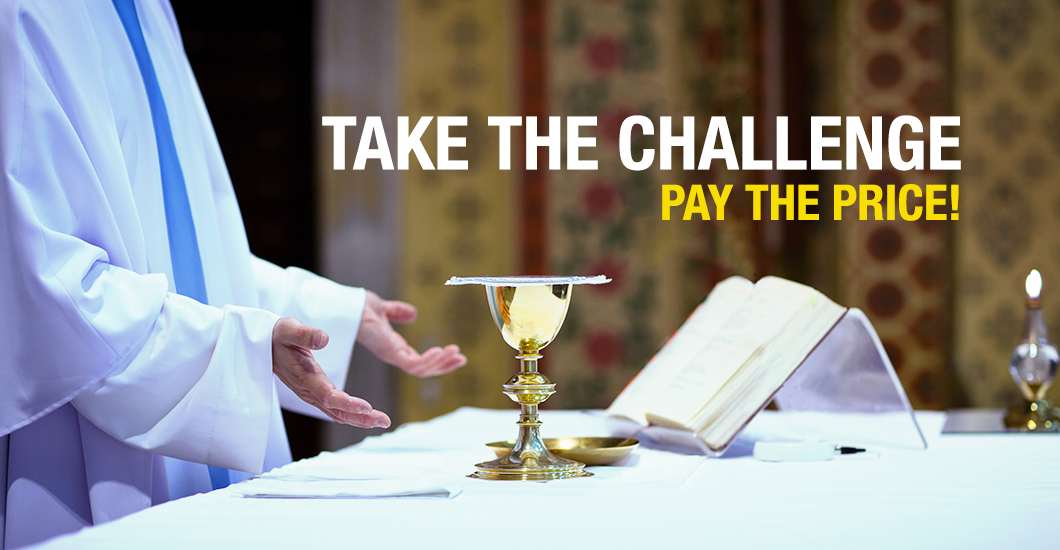Trending Articles
Take the Challenge: Pay the Price!
My wife and I bought this wonderful DVD, “The Greatest Miracle,” an animated movie about the mass. In one scene during the offertory, beside each person attending the Holy Mass stands his/her guardian angel. When the offertory begins, some of the guardian angels are able to fly toward the altar. Others remain standing with a very sad expression on their face because their appointed one is not offering any prayers. Those angels have nothing to place on the altar with the bread and wine. How many times have I been disengaged from what is happening at mass? By doing this, I have not allowed God to find me in the most powerful setting in history, the Holy Mass. How often have I disheartened my guardian angel?
The Cost Price
In Samuel 2:24, we read about Araunah trying to offer his oxen to King David for burnt offerings and the threshing sledges and yokes of oxen for wood—all for free! He did not want any payment from King David. David says, “I will buy it from you at the proper price, for I cannot sacrifice to the Lord my God burnt offerings that cost me nothing.” My attitude at Holy Mass is often very different from that of David. He pleased the Lord by offering a sacrifice that cost him something; I often go to the Holy Mass and do not offer anything, thus participating in a sacrifice that costs me nothing.
What should I offer that will cost me? Jesus reminds me of His sacrifice on the cross. The whole world seemed to be against Him, insulting and cursing Him, and He suffered greatly. A human temptation would be backlash toward those who persecuted Him, shouting back in anger or keeping silent and saying nothing, yet holding the anger inside the heart. Jesus resisted this temptation. Instead He prayed “Father, forgive them for they do not know what they do.” These words pleased the Father because the Son did not participate in a sacrifice that cost Him nothing but one that cost Him everything. Jesus was innocent and He chose to forgive. This is the payment God is expecting from me during the Holy Mass—to surrender my anger, frustration and hurtful feelings on the altar. I need to offer these at Holy Mass during the offertory and my guardian angel will burst with joy. When I offer up the negative stuff, I let God find me. At mass it is more difficult to offer to Jesus my hurt than money. Offering up my refusal to forgive those who have hurt me is what is really going to cost me.
To Follow Close
I became convinced of this when I meditated on Acts 7:54-60, which depicts the Martyrdom of Saint Stephen. In the profession of the faith, we proclaim that Jesus is seated at the right hand of God. In the account of Saint Stephen’s martyrdom, we read that as he is getting ready to be executed, he is filled with the Holy Spirit. In a vision he see the glory of God and the Son of Man standing at the right hand of God. Saint Stephen, filled with an unconditional love for God, sees an image of heaven as he is going to die. He sees Jesus, the Son of God, standing up. Jesus is cheering him on, probably clapping his hands and urging him toward the finish line. What a wonderful picture. It is probable to assume that Jesus’ eyes are fixed on his beloved servant Stephen or that they are looking into each other’s eyes.
In verse 58, a young man, Saul, enters the scene. He is the one persecuting the church. Let us hold that thought and come back to it. In verse 59 it states that as they were stoning Stephen, he called out, “Lord Jesus, receive my spirit.” Have we heard the words before? Luke’s gospel tells us that Jesus uttered these same words on the cross: “Father, into your hands I commend my spirit” Jesus then breathed his last.
When Stephen said, “Lord Jesus receive my spirit,” the Bible does not say he immediately took his last breath. Stephen, after seeing this great vision of Jesus standing up for him, was excited to get to heaven.
Jesus was crucified, Stephen was stoned. Stephen follows the formula. He says, “Lord, receive my spirit,” yet his spirit does not leave his body; he is still alive. Why?
Up Close
This is when Stephen looks at the face of Jesus again and comes to a true understanding of divine mercy. As he is being stoned, Jesus is standing up and cheering him on, clapping His hands, yet the eyes of Jesus are not fixed on Stephen but on Saul. When Stephen focused on the face of Jesus, he realized that Jesus was looking at Saul with extreme compassion. There was no anger, no disappointment, only a radical love on Jesus’ face.
Stephen then realized the difference between himself and Jesus. Stephen was in a hurry to get to heaven and said, “Lord, receive my spirit,” skipping over the prayer Jesus had made before He offered His spirit—Father, forgive them for they do not know what they are doing. Stephen realized he was offering a sacrifice that cost him nothing.
Jesus is divine mercy. We have a Savior who looks kindly on the very people that crucified Him as He was taking His last breath. Jesus wants the people who crucified Him to be with Him forever in eternity. This is the nature of divine mercy.
In today’s society, our merciful Savior looks with compassion on the perpetrators of crime and murder, in the hope of redeeming them.
Does this action of Jesus bother us? Saint Stephen is not a saint today because he was stoned for his faith in Jesus. In Saint Paul’s discourse on love he says that “if you hand your body over you may boast, but have not love, you are nothing”.
Ready-to Pay the Price?
When Saint Stephen did not die as expected and looked at the face of divine mercy, he understood the hidden desire of the sacred heart-Jesus was excited that Stephen was coming to heaven. He would be very happy if Saul, the murderer, also made it to heaven. Divine mercy is extending an invitation to Stephen-will you pray the prayer of forgiveness as I did on the cross, for all of humanity? Will you pray the prayer of conversion for souls who are perishing? Will you intercede on behalf of those who are ending your life? It is at this point when Stephen understands the unfathomable love of divine mercy. His sincere response, “Lord, do not hold this against them,” got him over the finish line into heaven. When he forgave those who were stoning him, his sacrifice became pleasing to God because it had cost him. He paid for it by surrendering the anger he held toward those who were hurting him. This prayer is what made him a Saint. The Bible says that after he prayed this prayer he fell asleep.
Let us ask ourselves again, does this action of Jesus bother us? Is he showing us less love by looking with compassion at those who are persecuting us and making us suffer? I do not believe so. I think we should interpret this attitude of divine mercy in this manner: God places much value, and regards very highly, the prayer of forgiveness, the prayer of conversion and the intercession we offer on behalf of others. He responds when these prayers come from our hearts because he loves each of us and sincerely desires all to be with Him in heaven. It is very hard to pray for those who are persecuting us. Can we pray sincerely that they might also get to heaven? God can do something with the little we offer. If we ask Him He will help us pray, with all sincerity, for the conversion of sinners. This response to divine mercy will help us get over the finish line of our lives to meet the Savior in heaven. This is what will make us Saints; this is what made Stephen a Saint.
Lord Jesus, help me to allow you to find me every time I attend the Holy Mass or pray. Help me to surrender all that is negative inside of me, so that I am offering a worthy sacrifice that costs me dearly, along with Your sacrifice. Since this is pleasing to the Father, I can truly receive the graces of the Eucharist and rejoice with my guardian angel. Amen.
Jenson Joseph has been part of Shalom Media as a speaker at the Shalom Conferences. He lives with his family in Michigan, USA. Watch his series at shalomworld.org/show/discipleship
Latest Articles
Want to be in the loop?
Get the latest updates from Tidings!








